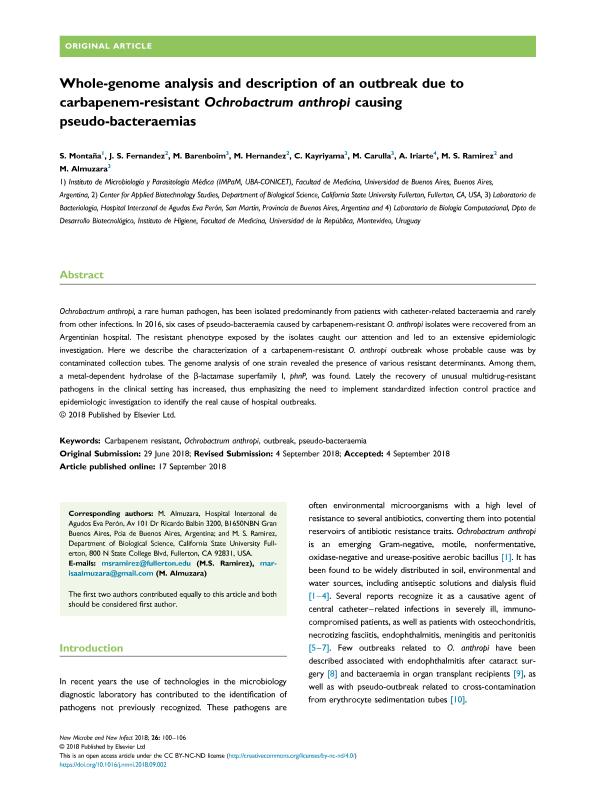Artículo
Whole-genome analysis and description of an outbreak due to carbapenem-resistant Ochrobactrum anthropi causing pseudo-bacteraemias
Montaña, Sabrina Daiana ; Fernandez, J. S.; Barenboim, M.; Hernandez, M.; Kayriyama, C.; Carulla, M.; Iriarte, A.; Ramirez, M. S.; Almuzara, M.
; Fernandez, J. S.; Barenboim, M.; Hernandez, M.; Kayriyama, C.; Carulla, M.; Iriarte, A.; Ramirez, M. S.; Almuzara, M.
 ; Fernandez, J. S.; Barenboim, M.; Hernandez, M.; Kayriyama, C.; Carulla, M.; Iriarte, A.; Ramirez, M. S.; Almuzara, M.
; Fernandez, J. S.; Barenboim, M.; Hernandez, M.; Kayriyama, C.; Carulla, M.; Iriarte, A.; Ramirez, M. S.; Almuzara, M.
Fecha de publicación:
09/2018
Editorial:
Elsevier
Revista:
New Microbes New Infections
ISSN:
2052-2975
e-ISSN:
2052-2975
Idioma:
Inglés
Tipo de recurso:
Artículo publicado
Clasificación temática:
Resumen
Ochrobactrum anthropi, a rare human pathogen, has been isolated predominantly from patients with catheter-related bacteraemia and rarely from other infections. In 2016, six cases of pseudo-bacteraemia caused by carbapenem-resistant O. anthropi isolates were recovered from an Argentinian hospital. The resistant phenotype exposed by the isolates caught our attention and led to an extensive epidemiologic investigation. Here we describe the characterization of a carbapenem-resistant O. anthropi outbreak whose probable cause was by contaminated collection tubes. The genome analysis of one strain revealed the presence of various resistant determinants. Among them, a metal-dependent hydrolase of the β-lactamase superfamily I, phnP, was found. Lately the recovery of unusual multidrug-resistant pathogens in the clinical setting has increased, thus emphasizing the need to implement standardized infection control practice and epidemiologic investigation to identify the real cause of hospital outbreaks.
Palabras clave:
CARBAPENEM RESISTANT
,
OCHROBACTRUM ANTHROPI
,
OUTBREAK
,
PSEUDO-BACTERAEMIA
Archivos asociados
Licencia
Identificadores
Colecciones
Articulos(IMPAM)
Articulos de INSTITUTO DE INVESTIGACIONES EN MICROBIOLOGIA Y PARASITOLOGIA MEDICA
Articulos de INSTITUTO DE INVESTIGACIONES EN MICROBIOLOGIA Y PARASITOLOGIA MEDICA
Citación
Montaña, Sabrina Daiana; Fernandez, J. S.; Barenboim, M.; Hernandez, M.; Kayriyama, C.; et al.; Whole-genome analysis and description of an outbreak due to carbapenem-resistant Ochrobactrum anthropi causing pseudo-bacteraemias; Elsevier; New Microbes New Infections; 26; 9-2018; 100-106
Compartir
Altmétricas



